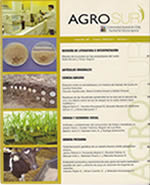UNDERNUTRITION DURING EARLY GESTATION IN SHEEP: LONG TERM IMPACT ON THE OFFSPRING
Main Article Content
Abstract
Nutrition during gestation is the most important environmental factor for embryo and fetal development. A restriction during the first three months of pregnancy could be imperceptible in terms of live weight of the newborn lamb due to the compensatory effect of the placenta when normal feeding is reestablished. However, it negatively affects blood flow due to a reduction of plasma concentration of nitric oxide and polyamines which are important regulators of uterine and placental vascularization, resulting in a reduced nutrient flow from mother to fetus. The consequences of this situation have long term effects in the productive and reproductive performance of the offspring, resulting in economic losses for the productive system. Among these effects are the reduction in ovulatory rate, the increase in fat deposition, a reduction in quality and quantity of wool and muscle fibers and the increase of behavioral reactivity of the animals during the sudden restriction and appereance of a stimulus. Therefore, proper nutrition during the first gestation stages should be emphasized because of its effects on the extrauterine life of the offspring. This effects have been attributed to permanent consequences of maternal nutrition on gene expression patterns, effect known as "fetal programming".

